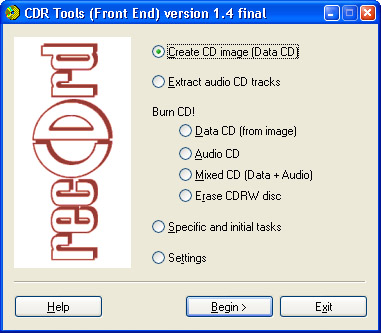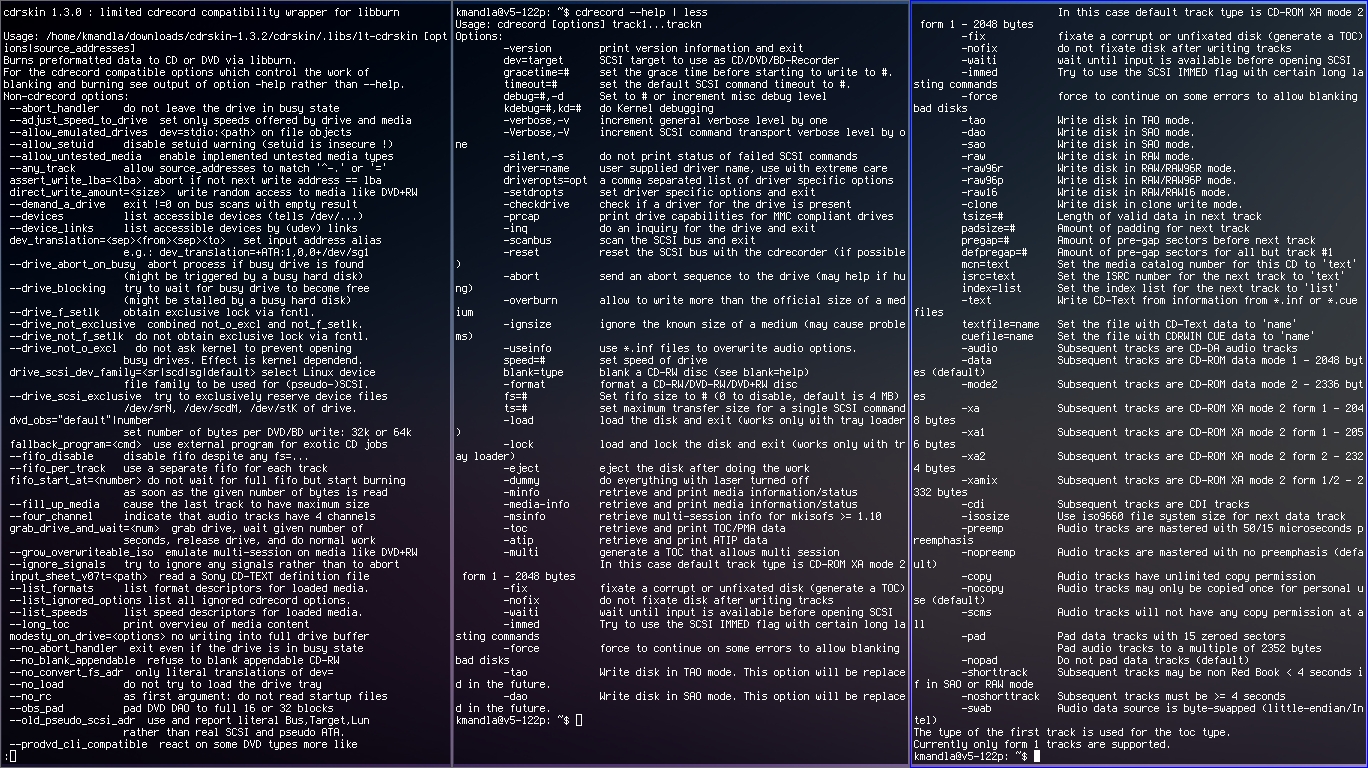cdrtools
The cdrtools is a collection of portable open source programs for data processing and recording on CD / DVD / BluRay media (called " burning" ), most of which were developed by Jörg Schilling. The main components are:
- Cdrecord, a console - burning program
- Cdda2wav, CD Ripper with paranoia support reading metadata and hidden tracks and thus a complete Digital Audio Extraction allowed
- Libparanoia, a library version of the relevant codes of cdparanoia
- Mkisofs for generating a CD file system
- Readcd, an elite program with CD -clone skills
The cdrtools have long been the standard solution for burning CDs in Linux before most major Linux distributions the current version of the software ( according to their interpretation of the license) can no longer included due to a license change. Jörg Schilling disagrees with this interpretation of the license, but can not force to market its current version Linux distributions.
Cdrecord
Cdrecord is a burning program, whose development was begun in late 1995 by Jörg Schilling on the basis of the developed since August 1986 libscg.
In February 1996 it was first released for Solaris. Porting to Linux, HP- UX, AIX, IRIX and 20 other platforms followed in 1997.
Cdrecord was at the instigation of data archivists from the European Southern Observatory in February 1998 one of the first programs with DVD support. However, the source code for DVD support could not be published because of an NDA with the drive manufacturer Pioneer long time and the purchase of a DVD burner was regulated because of the reservations of the U.S. film industry in the period between September 1997 and August 2001. With the publication of the first over the counter DVD burner in September 2001, initially free binary versions of cdrecord- ProDVD issued and since spring 2006 is open source all code of cdrecord- ProDVD. Since July 2007, the cdrtools offer rudimentary at first, but now full Blu -Ray support also.
Cdda2wav
Cdda2wav is a digital audio extraction program, whose development was started in 1993 by Heiko Eißfeldt under Linux. Since 1998, it uses the libscg as a platform-independent SCSI transport and became portable. Since April 2002, uses cdda2wav the libparanoia, which is derived from cdparanoia and is especially beneficial for damaged media. In addition, cdda2wav early 2002 expanded to read vendor-specific routines that provide situationally better reading performance than the standard commands. This cdda2wav can also severely damaged and deliberately read defective media that could not be processed in some cases with the conventional selection methods.
Readcd
Readcd reads data sectors optical media and can therefore be seen as a complement to cdda2wav.
Readcd can read CDs in RAW mode along with additional metadata, thus enabling a " cloning" of CDs.
Another feature is the ability to readcd error correction data read out ( C1/C2 with CDs and DVDs at PI8/PIF ) to assess the quality of a medium.
Mkisofs
Mkisofs is a program for creating ISO -9660 Dateisystemabbildern. It was started by Eric Youngdale in Linux 1993. Since 1997 it has been incorporated into the cdrtools and Eric Youngdale withdrew gradually from the development work back. In August 1999 Eric Youngdale handed the development of Jörg Schilling.
Mkisofs supports both ISO 9660 and Rock Ridge, Joliet and UDF.
By using libfind can put it directly to mkisofs the features and options of the find program.
Libparanoia
Libparanoia is software whose origin was written in 1997 by Christopher Montgomery ( Monty ) as a patch to cdda2wav to improve the reading quality even with damaged media and bad drives. Since 1998, the patch as cdparanoia, a fork of cdda2wav, also sold separately. Joerg Schilling has finally transferred in the spring of 2002, the major parts of the functionality of the patches in the portable libparanoia and thus made available for cross-platform cdda2wav and other programs.
The relevant code in cdparanoia is based on the reading routines in cdda2wav and tried by different reading results found defective parts by re-reading of all sectors, and by the skilful blending of the results to improve. If a drive sectors can not read, either because the medium is too damaged or because the media has intentionally affixed by the manufacturer defects, then denied the paranoia code. An error detection would be possible only in such cases, if an evaluation of the C2 error information would take place as well as in both cdda2wav libparanoia.
Cdrtools as a name for the whole package
The name " cdrtools " was introduced in 1998 by integrating cdda2wav in the common source code and in the common build system.
On operating systems such as Solaris, Linux, or FreeBSD use numerous programs for both the console and graphical user interface for the actual recording process, the cdrtools or its spin-off, including:
- K3b as a multifunction interface in KDE for burning and copying CDs and DVDs.
- X-CD -Roast, a GTK - based, cross-platform program available for Linux, FreeBSD, OpenBSD, and many other Unix-like operating systems
- Brasero for the GNOME desktop environment
- Plugins for the KDE file manager Konqueror
- Plugins for the GNOME Nautilus file manager
The Windows burning tools InfraRecorder and cdrtfe build as a graphical front-ends also on the cdrtools. The Cdrtools are also available for various other operating systems.
License debate
In February 2005, Joerg Schilling put his Makefile system, a separate project, which had been used to control the compilation of various software projects since 1992 in order to facilitate the freer in his view CDDL license. This system is also used to create the cdrtools. It saw the Debian project a problem due to incompatible licenses. The author says that the GPL projects were in the cdrtools associated Makefile in the project folders further under the GPL. He refers to the interpretation of a lawyer, according to the " scripts to control compilation " may be under any license, as long as it permits the disclosure. The author presented more parts of cdrtools to the CDDL to unify the license, but what the concerns from the Debian project could not dispel.
Because of this problem to the Debian project initiated cleavage of the cdrtools under the name cdrkit and removed the original project from their own repositories. Many other Linux distributions also replaced cdrecord by Debian's secession. Gentoo is not affected as source code - based distribution of this license question and provides the current cdrtools version and the elimination of an alternative. Oracle distributed exclusively cdrecord with its Solaris operating system. Slackware does the same.
The fact that the GPL program mkisofs links against a CDDL library is still viewed by the Debian project as a violation of the GPL. However Jörg Schilling considered the binary result of the automatic link time not as a derivative work, but as a collective work under the U.S. copyright law. According to legal opinion from lawyers who have been silent so far on this issue, are the parts of the GPLv2, which relate to integrated, external program parts ( "The 'Program', below, Refers To any search program or work, and a, work based on the Program Means Either the Program or any derivative work under copyright law:. did is to say, a work Containing the Program or a portion of it, Either verbatim or with Modifications and / or translated into another language " ) in the case not apply in a Collective Work, but where there is disagreement about the boundaries between derivative works and compilations. With his views that it is collective works (and not derivative works ) in question are combinations Schilling expressly contradicts the so-called by him " allegations of the FSF " to the GPL.









